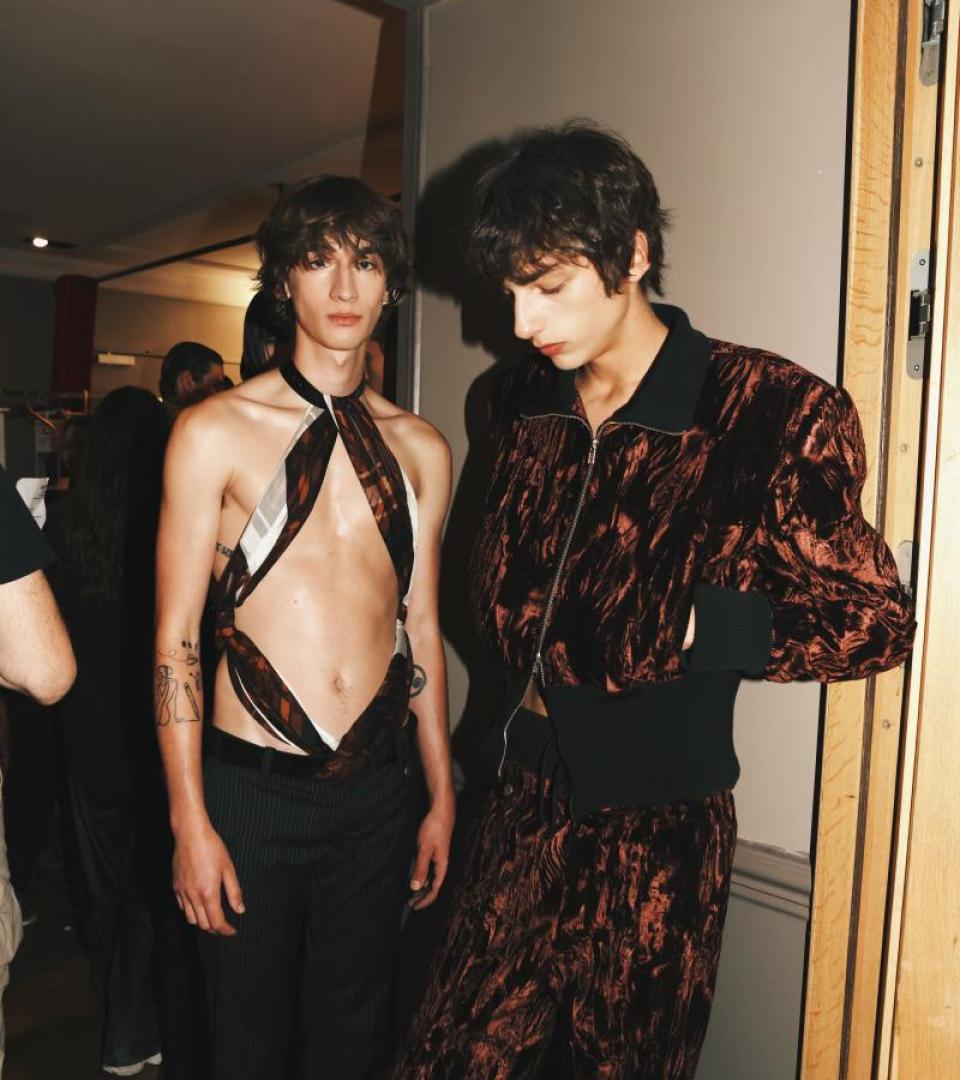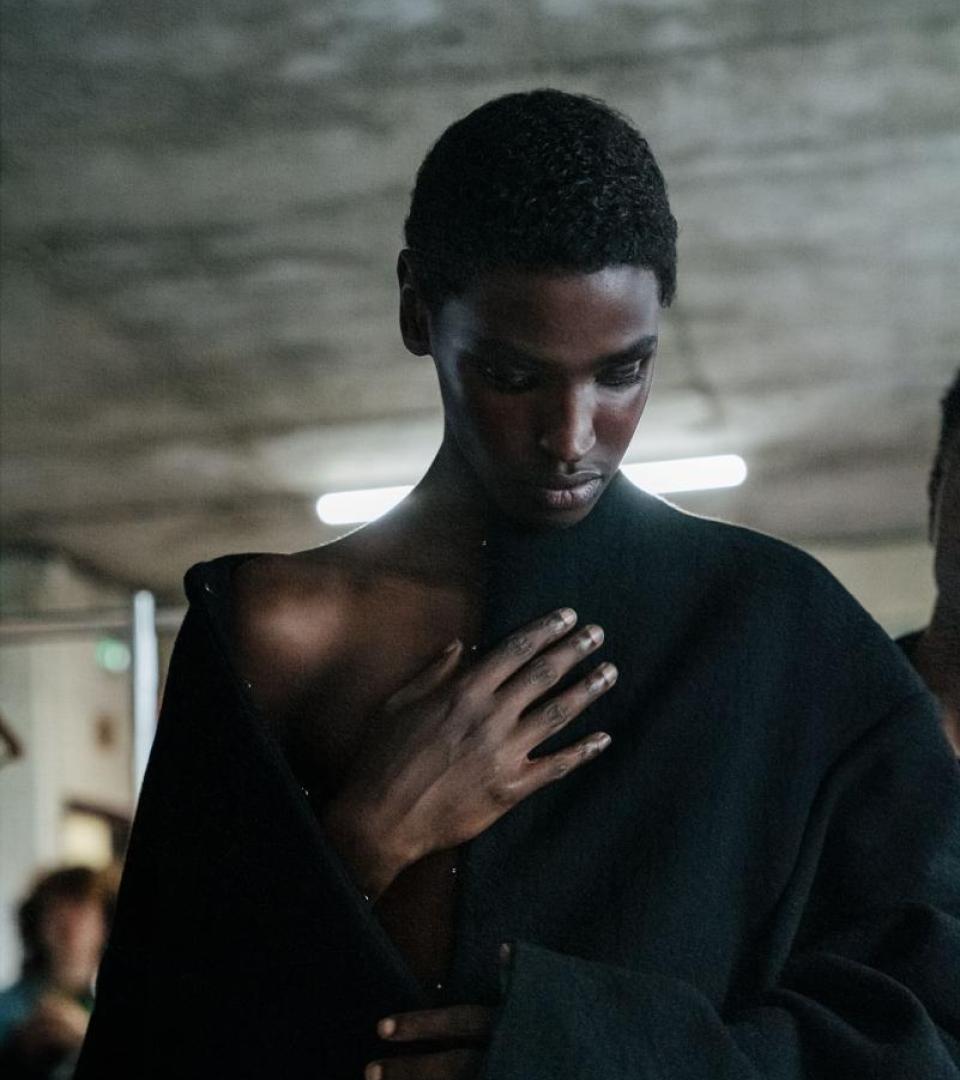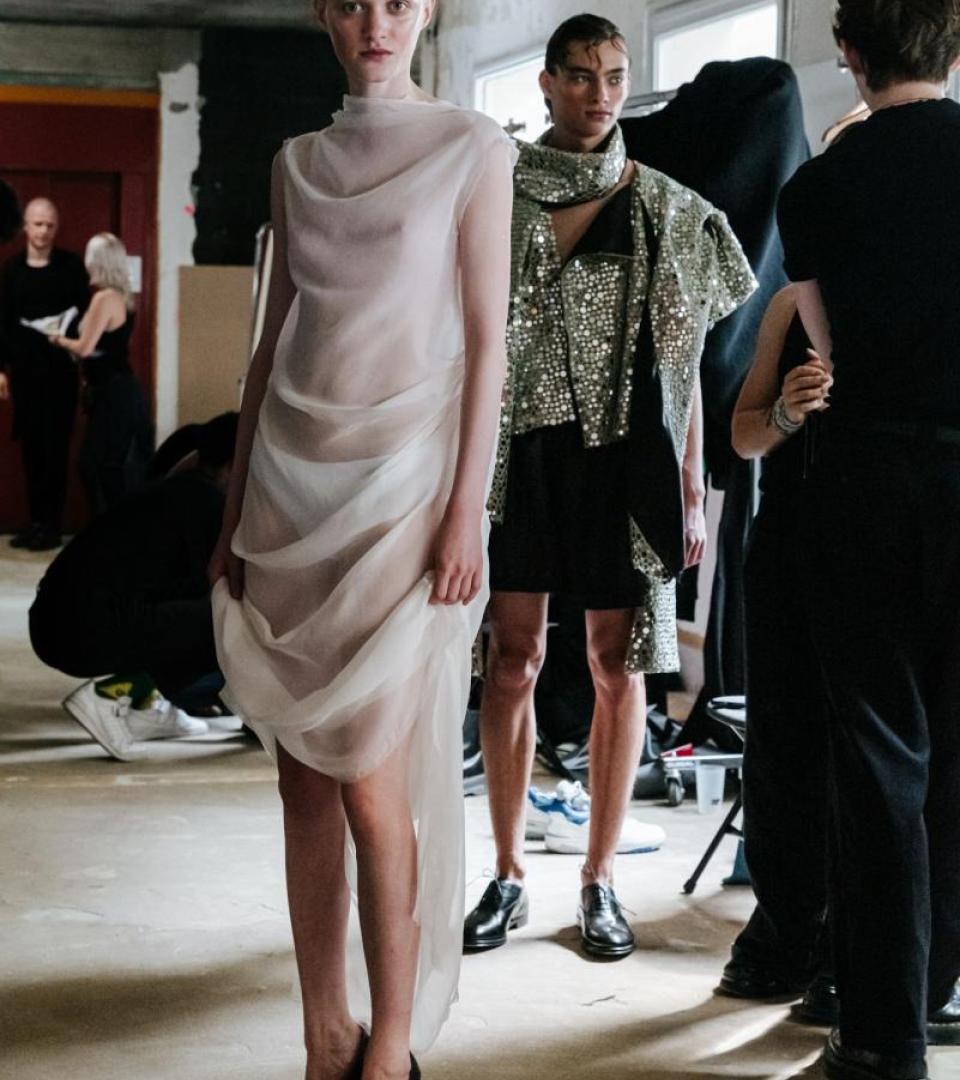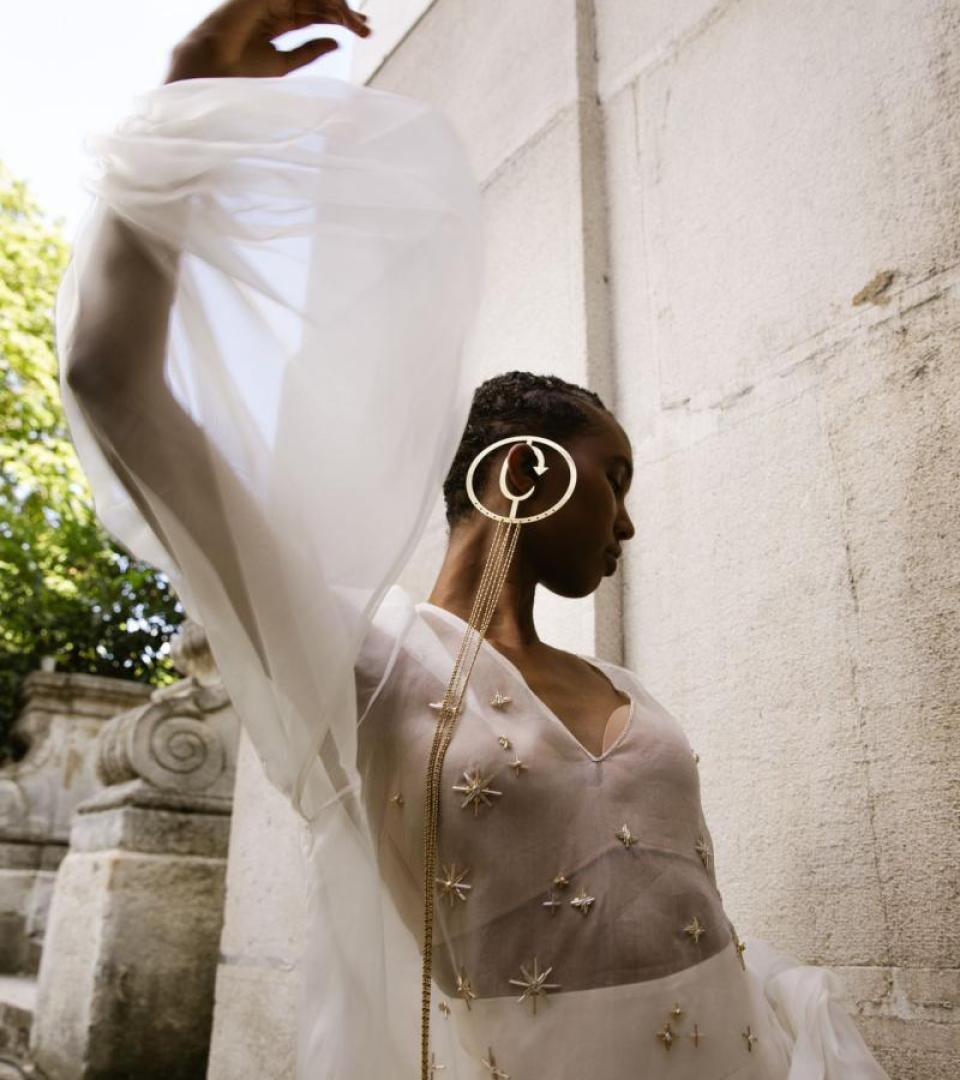CFCL —Clothing For Contemporary Life— / Yusuke Takahashi
Founded in 2020 by Yusuke Takahashi, former Issey Miyake Men's designer, CFCL — Clothing For Contemporary Life — is a brand that merges technological innovation with ethical purpose. Takahashi, shaped by a decade under Issey Miyake and by a deep concern for the planet, defines his label as a “Designer Brand × Social Impact Business.” Knitwear becomes a tool for everyday life — functional yet environmentally conscious — with over 90 percent certified materials and a clear path towards carbon neutrality. For Takahashi, fashion is not the expression of ego but a means to create value for wearers, communities and future society. In 2024, his vision was recognised internationally when he was named among the Vogue Business 100 Innovators in Sustainability.
What are your thoughts about the significance of this season given so many major designer debuts?
As a fashion enthusiast, I'm excited to see what kind of debut collections they will present. As a brand that is part of Paris Fashion Week, its success is also extremely important for CFCL's branding. I made my Parisian debut as a designer for Issey Miyake Men in 2013 at the age of 27, and have continued to present collections here every year since founding CFCL, except for the two pandemic years of 2020-21. I feel that Paris Fashion Week has nurtured me, and I intend to continue presenting my collections there. My aspiration is to become a driving force for both PFW and global fashion in the future.
What excites you in fashion right now?
The exciting challenge lies in balancing sustainability and creativity. This includes increasing the use of certified materials, reducing greenhouse gas emissions and waste, ensuring supply chain transparency, creating value for all stakeholders such as employees and subcontractors, and achieving closed-loop systems within the fashion industry. We are entering an era where designers must naturally confront these issues in the process of creating clothing. While they present significant hurdles for both design and business expansion, I believe the greater the challenge, the more worthwhile it is to take it on. CFCL has already achieved a certified material usage rate of over 90 percent in its Spring-Summer 2025 collection. We are also making progress toward carbon neutrality by 2030 through ongoing reduction efforts. This month, we opened a new store in Takanawa, Tokyo. Alongside the new collections, we are also offering pre-owned pieces that CFCL has collected. This initiative is recognized not only as ethical but also as a groundbreaking way to connect younger consumers, and it received significant coverage in Japanese fashion media. I believe that various constraints also present opportunities to develop new business models.
What is one reason to be optimistic about the state of fashion going forward?
The fact that people around the world are interested in fashion, and that fashion is now accessible not only to a wealthy few, but to society at large, gives us reason to be optimistic about the future of the fashion industry. We firmly believe that fashion's influence can be used to guide society in a positive direction. Paris has long led the world in spreading cutting-edge fashion and offering fresh visions to countless people. CFCL aspires to do the same.
What are the main elements that make your work unique and fulfilling?
I define CFCL as a new category of company: a “Designer Brand × Social Impact Business.” We have incorporated the philosophy of stakeholder capitalism, as advocated by Eiichi Shibusawa, the father of the Japanese economy, into our brand’s operation. When designing clothing, I am always mindful not to let it become simply a reflection of the designer's ego. At the same time, I consider whether what we create brings value to the lives of those who wear it, supports the factories and communities where it is made, contributes to the global environment, and meets the needs of future society. Ultimately, my goal is to be able to say with confidence that “by designing, producing, and selling clothing, we are helping to build a better society.”
What do you enjoy most about Paris Fashion Week?
I enjoy the creative competition offered by this exceptionally democratic platform. Although commercial fashion brands are as numerous as the stars around the world, I believe that Paris Fashion Week brands stand apart. Another source of joy is experiencing the dynamic energy that arises as people across the globe freely share their thoughts on the latest collections through social media. These conversations often explore new forms of expression, ideas of autonomy, and the balance between history and contemporary context. In the world of fashion, which is closely linked to politics and capitalism, I have come to hold a renewed respect for the platform. It allows both long-established French maisons and small, emerging brands like ours from outside France to present their work on equal footing.
Do trends still matter?
When it comes to creation, fashion trends are not important to me as a designer. However, because I may be unconsciously influenced by them, I find it necessary to understand where current trends come from in order to maintain a healthy distance. At the same time, I must stay attuned to deeper, irreversible shifts in society. These include emerging phenomena driven by long-term forces such as technological advancement or lifestyle changes related to climate change. Journalists often ask me, “Is it really necessary to present new collections twice a year?” My answer is always, “Yes.” The world is changing faster than we imagine, and I believe fashion must keep pace by evolving in step with the global rhythm.
What are the key cultural or societal influences shaping womenswear today, and how do they inform your creative direction?
I believe that ever since the birth of fashion in modern Europe, “the advancement of women in society” has always been a central issue in fashion discourse. Until the day comes when women, who tend to be treated as underrepresented, can truly stand on equal footing with men, I believe everyone, including designers, must continue to confront this reality. Instead, I approach clothing in the same way as I would design architecture, furniture, or homeware, with the mindset of creating practical tools. This approach means prioritizing practicality in daily life over appearance. For example, garments should be comfortable for women to wear and easy to care for. Most CFCL garments are machine-washable, lightweight, and wrinkle-resistant.
Given current uncertainties, in what ways do you see brands/houses effectively driving business growth?
I believe that the most effective way for a brand to drive business growth is by clearly defining its autonomy and purpose. Since the rise of fast fashion, more clothing has been produced than there are people on Earth. In a world overflowing with garments, it is easy to see that simply trying to sell clothing is no longer effective. With so many similar-looking items, products lacking clear ideology, and clothing made purely for short-term profit, one could argue that “meaningful clothing” has become almost nonexistent. CFCL aims to be a brand that matters. Rather than being just another brand the world would carry on without, we want to be remembered with reflections like, “Society changed in this way because CFCL existed at that time,” or “Looking back, CFCL was ahead of its time.” We aspire to a future, even 100 years from now, in which this philosophy is deeply embedded in society and passed down through generations.
Tell us something surprising about how you got to where you are today?
When I began my career as a fashion designer in the 2010s, the world was entering a time when social and environmental issues were becoming increasingly serious and impossible to ignore. Two events in particular left a strong impression on me: the tragic collapse of Rana Plaza in 2013, and the United Nations’ 2019 report identifying the fashion industry as the second most polluting in the world. I was raised in a family where my mother was a socially conscious writer and my father a lawyer. This upbringing gave me a deep awareness of the importance of protecting and supporting the socially vulnerable. During my ten years at the Miyake Design Studio, Maestro Issey Miyake continually challenged me to consider the social role of clothing and the meaning behind its creation. His guidance compelled me to think critically and deeply. In 2019, the year my daughter was born, I was struck by the global attention surrounding Greta Thunberg's climate advocacy, as well as the dismissive reactions of many adults. These events pushed me to start my own venture. I felt a strong sense of responsibility to help create a better future for my daughter than the one we currently face. I also came to believe that even a small message, if it holds true, has the power to resonate across the world. This belief became the catalyst that led me to launch CFCL six months later. I founded a brand with a mission to serve the public good and contribute to society through my work as a fashion designer.
In what ways is AI helping you develop and realise ideas that might not have been previously possible?
AI has not yet become a significant aid in the creative process. However, I believe it is useful for improving overall operational efficiency, especially in areas such as information aggregation and translation, not only for design purposes. In the near future, AI may be able to propose designs for commercial items based on the previous year's sales performance.
Your brand is relatively young. How do you think you can develop it in the current fashion scenario?
CFCL is planning to establish a new knitting factory in/near Tokyo. This initiative will significantly support CFCL's business development over the next decade. All CFCL garments are produced using computer programming-aided knitting, which differs fundamentally from the conventional production processes in the fashion industry. Since the number of knitting machines directly determines production capacity, factory limitations have been a bottleneck to growth. However, this constraint is now being addressed. We will continue to work with the factories that currently support our production. In the typical fashion industry, most production costs come from sewing labor, which often relies on low wages. In contrast, CFCL’s cost structure is primarily based on the use of machinery. This means our business model does not depend on global wage disparities. Instead, it represents a next-generation approach to fashion, making production near developed markets possible. In the future, we plan to establish additional factories near major urban centres.
Can you share a mantra that speaks to this moment in time?
Fashion has always been a powerful driver of social change worldwide.
This interview has been lightly edited.



